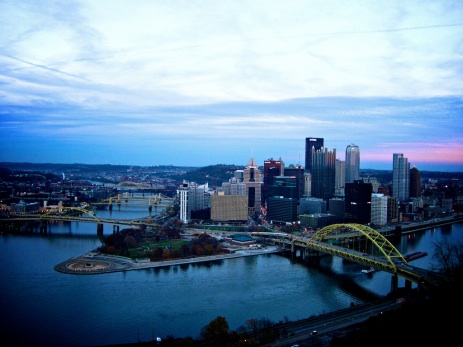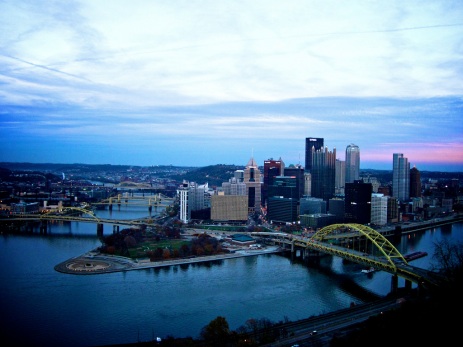 The drinking water of tens of millions of Pennsylvanians is threatened by natural-gas fracking — including the 2.3 million who live in Pittsburgh.Photo: Via Tsuji
The drinking water of tens of millions of Pennsylvanians is threatened by natural-gas fracking — including the 2.3 million who live in Pittsburgh.Photo: Via Tsuji
Residents of Pittsburgh — as well as potentially tens of millions of other everyday citizens in the Northeast corridor who rely on their taps to deliver safe water — are consuming unknown and potentially dangerous amounts of radium in every glass of water. That’s the buried lede in the Sunday New York Times‘ massive exposé on fracking, the relatively new process for extracting natural gas from the massive shale formation that stretches from Virginia to New York state.
But don’t take the Times‘ word for it: The day the exposé appeared in print, John Hanger, secretary of Pennsylvania’s Department of Environmental Protection until June 2010, confirmed on his own blog that the main thrust of the story was dead-on: No one has any idea if the radioactive material in the wastewater from fracking is appearing downstream, in drinking water supplies, in quantities in excess of EPA recommendations, and we’d better find out:
We must not drift into a war of competing theories or studies. We need the facts. Pennsylvanians deserve nothing less.
The Pennsylvania Department of Environmental Protection should order today all public water systems in Pennsylvania to test immediately for radium or radioactive pollutants and report as soon as good testing allows the results to the public. Only testing of the drinking water for these pollutants can resolve the issue raised by the NYT.
Hanger also says there are a number of oversights in the Times article: He says it unfairly characterizes Pennsylvania’s response to the fracking crisis. Under his tenure, the number of gas-well inspectors doubled and a number of new regulations were put in place — basically, he makes the case that Pennsylvania would be much worse off if it weren’t for its efforts to curb the worst atrocities of fracking.
Industry dodges on the issue of radiation: A rebuttal of the Times piece by an industry group, the Marcellus Shale Coalition, does not even address the issue of radium in the wastewater that is dumped from fracking operations into water-treatment plants and thence water sources that are ultimately used by cities for drinking water.
The Coalition does claim that the majority of wastewater from fracking operations in Pennsylvania is reused, however, and that the industry aims for 100 percent reuse. This is great news, if it’s achieved — but you can bet it wouldn’t happen in the absence of tough regulation.
What the Times piece and the subsequent responses illustrate is that oversight and environmental protection can work, even in the face of headwinds generated by industry — but that in this case, regulation has been incomplete, and even those responsible for drafting and enforcing that regulation believe there are legitimate worries about the current state of fracking wastewater in Pennsylvania.
Oscar-nominated doc Gasland covers the other, even more dramatic issues with fracking: Importantly, the radium and wastewater issues are completely independent of the issue of groundwater contamination in the immediate area of fracking operations. The latter is the subject of the documentary Gasland, which was nominated for an Oscar for best feature-length documentary but didn’t ultimately win. (Donald Carr reviewed the film for Grist when it first debuted at Sundance.)
Gasland‘s reach and Oscar nomination brought enough attention to the issue to warrant apparent censorship of industry concessions that the documentary got things right:
“We have to stop blaming documentaries and take a look in the mirror,” Matt Pitzarella, a spokesman for gas producer Range Resources Corp., was quoted as saying in [The Wall Street Journal].
However, if you go to the article, you won’t find Pitzarella’s statement because within the hour the quote disappeared, say citizen journalists, who screen captured it and posted it on Twitter. Gasland director [Josh] Fox, in Los Angeles, awaiting Sunday night’s Oscar ceremony, has the screen shot of the original version.
The industry also tried to get Gasland disqualified from the Oscars altogether:
The natural gas industry has spent months attacking the documentary Gasland as a deeply flawed piece of propaganda. After it was nominated for an Oscar, an industry-sponsored PR group asked the Academy of Motion Picture Arts and Sciences to reconsider the film’s eligibility.
New York state is next — and the resulting drilling could threaten the drinking water of New York City itself: If the industry has its way, Pennsylvania is just the start. New York state is next, if it’s not feeling the effects already — the Times reported that fracking waste fluids have already been discharged into Cayuga Lake, which abuts Ithaca, N.Y. The Natural Resources Defense Council sees the Times exposé as yet more evidence that fracking is an unsafe technology that warrants a go-slow approach, especially in a state as dependent on natural waterways for its drinking water as New York.
The article makes the important point that in Pennsylvania — where fracking has exploded over the past few years — the vast majority of drilling wastewater is being handled in sewage treatment plants that discharge into surface water bodies (like the Susquehanna, Delaware, and Monongahela Rivers, which collectively supply over 21 million people with drinking water). […]
The same is true in New York. As conceded in the highly flawed draft environmental review document issued by the state’s Department of Environmental Conservation in the fall of 2009, wastewaters contaminated with radionuclides and other hazardous substances generated in New York would have to be handled at treatment plants for discharge into surface waterbodies. The document further concedes that there are no adequately permitted facilities to handle this material in the state.
Worth noting: New York City’s water supply is unfiltered and comes straight from reservoirs after just minor chlorination. Try doing that after fracking comes to upstate New York.


